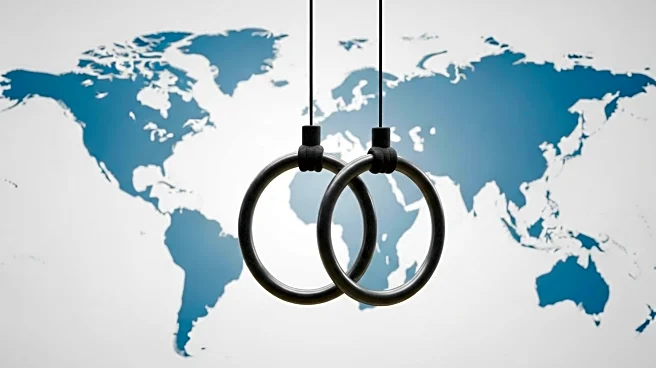What's Happening?
The International Gymnastics Federation (FIG) has expressed support for Indonesia's decision to deny visas to Israeli athletes scheduled to participate in the World Championships. The event, set to take place from October 19 to 25, will be affected by this decision, as Israeli gymnasts, including Artem Dolgopyat, Eyal Indig, Ron Pyatov, Roni Shamai, Lihie Raz, and Yali Shoshani, are unable to compete. The Indonesian authorities announced the revocation of previously issued visas, citing immigration service decisions. This move has prompted the Israeli Olympic Committee and Gymnastics Federation to consider legal actions to challenge the visa denial.
Why It's Important?
The decision to deny visas to Israeli athletes has significant implications for international sports diplomacy and the athletes' competitive opportunities. It highlights ongoing geopolitical tensions that can influence global sporting events. The absence of Israeli gymnasts from the World Championships may affect the competitive landscape and medal distribution, potentially disadvantaging the athletes and their national federation. This situation underscores the intersection of politics and sports, where international relations can impact athletes' participation and the spirit of global sportsmanship.
What's Next?
The Israeli Olympic Committee and Gymnastics Federation are exploring legal avenues to contest the visa denial, which could lead to diplomatic discussions or interventions from international sports bodies. The outcome of these actions may set precedents for how geopolitical issues are handled in international sports. Stakeholders, including other national gymnastics federations and international sports organizations, may weigh in on the situation, potentially influencing future policies regarding athlete participation in global events.
Beyond the Headlines
This development raises questions about the ethical responsibilities of international sports organizations in navigating geopolitical conflicts. It may prompt discussions on the role of sports as a platform for peace and unity versus its susceptibility to political influences. The long-term impact could involve reevaluating visa policies and the criteria for athlete participation in international competitions, aiming to ensure fairness and inclusivity.









